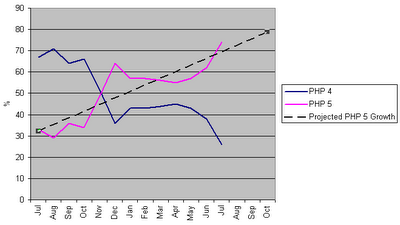No doubt that it will still take some time for PHP 5 to reach PHP 4's existing installed base. The main reason for this are the numerous PHP 4-based applications that were built over the years, and if it's not broken, don't fix it. Even at Zend, we have some apps which don't need to be maintained anymore, so we still run PHP 4 for those. But pretty much all new development is done with PHP 5.
That said, I think when judging adoption, the most important statistic is still understanding what people developing and building Web sites with PHP are actually using today. Last week I decided to check up on our support statistics again and see how things have changed in the last few months. I was pretty amazed with the latest results. Although I knew many were waiting for PHP 5.1 before upgrading, its release in last November seems to have created a huge increase in PHP 5 adoption. In July over 74% of support tickets were by customers using PHP 5 (and remember we do support both versions). You can see the results (in %) in the following graph. PHP 4 and PHP 5 are of course inverses of each other.

I've added a trendline to the graph which gives a good idea of how adoption seems to be quickly accelerating since the release of PHP 5.1. I'm the last one to recommend trusting such extrapolations on data, but there definitely seems to be some kind of trend here, and I think it's past the point of no return.
P.S. - Thanks to Shahar Evron, from our support team and contributor to the Zend Framework for getting me these stats.